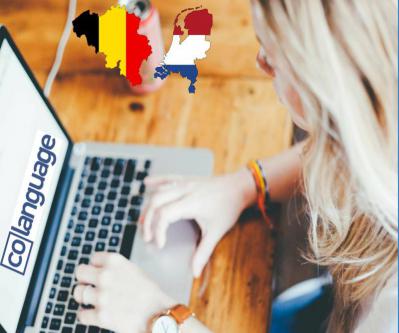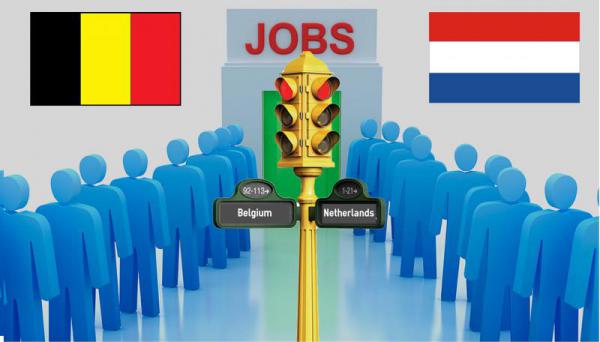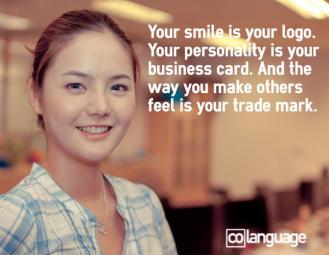Applying for a job in the Netherlands or Belgium
Sign up for free to get all information about private lessons and our available group courses (A1, A2, B2, B2, C1, C2)
Sign up for freeSign up for free to get all information about private lessons and our available group courses (A1, A2, B2, B2, C1, C2)
Sign up for freeDo you want to know the job interview weaknesses and job interview tips? Do you want to know how much the selection procedure differs from your country? Each country has its own cultural differences when it comes to job interviews, so when you know what is what it will get a foot in the door. On this page you will find the exact information how to get the job that you want in any company within Belgium or the Netherlands. All you have to do is just follow the next four steps and you will be prepared to nail your job interview. Many foreigners easily find work in Belgium or the Netherlands, and chances of finding jobs in main cities, particularly jobs in Brussels or Amsterdam, are increased by the extensive international business scene and European Union (EU) presence. You can work for the European parliament, European commission and many other European parliament careers as most of them are located in Belgium. You can find many jobs in Amsterdam for English speakers.
One of the most important things during your application is the first impression the company gets about you. The first contact between you and the company will probably be your CV and cover letter. Therefore it is important to send both documents to the company attending a brief e-mail. How to write a CV for Belgium or how to write a cover letter for a company in the Netherlands? Don’t worry, both the CV and the cover letters are the same in both countries.

Take online language lessons with a professional teacher
You should mention the following information in your CV for sure:
Next to that you can be creative and add information that you think is necessary, for example you can add which driver license you have or other specific certificates that could be useful. Also mention if you have any experience abroad.
It is not mandatory to add a picture on your CV but if you add one make sure that it is professional. With professional I mean a clear picture of just you with a plain background. Make sure that you don’t edit the picture too much. Try to differ your CV from the others. As probably many people will apply for the same job position, you have to make sure that yours stands out. Try to be as creative as possible if the job requires creative skills, don’t spend many time on the design if you are applying for a job at the court.
The most important criteria that job interviewers will look at are probably your language skills. Belgium has three official languages – Dutch, French and German. If you address a Flemish company you should do so in Dutch. A Walloon company should be addressed in French, same thing for the German region. If you just master the English language than you should apply to an international company that offers English speaking jobs. Most of them will be located in Brussels or Amsterdam. The official language for the Netherlands is Dutch which is spoken by each inhabitant. Dutch people, in general, speak English very well; however it is important to speak at least a bit of Dutch or French for Wa lloon.
lloon.
For jobs in Belgium you should contact NARIC (for the Flemish region) or the Education section of the Ministère de la Fédération (for the Walloon region or Brussels). They offer certificates of all levels recognised in Belgium. For the Netherlands you can choose between two different certifications. You have the "Staatsexamen NT2" and the CNaVT. If you want to work in certain professions, you may have to have your professional qualifications, both your training and experience, officially recognised or regulated before you can work in Belgium or the Netherlands.
To end, you don’t need to enclose educational certificates. If your employer really wants a proof he will ask you to bring the official documents with you to the job interview. Belgian employers don’t always reply to job applications. If they don’t reply by themselves within three weeks you can assume that your application wasn’t successful. Don’t take this personal, it’s part of the Belgian culture. Even though companies are obliged by law to let know something, they will not always do this.
Before going to your job interview you should prepare yourself for your interview. If you don’t know what the company is about and the essential background of the company you might as well stay at home. Read their website carefully and make a summary of the most important information. But next to that it’s also important to be on time. Dutch people are very punctual and don’t tolerate laggards. Therefore it’s better to be one hour earlier to avoid traffic jams especially if you want to work in Brussels or Amsterdam. Don’t forget that your job interview starts from the moment you arrive at the parking lot.
Bring your CV and cover letter to the job interview. Avoid to lie or exagerate in your cover letter or CV because the employer might refer to some paragraphs and then it is your turn to clarify. Just make sure that you can explain everything that you wrote. While writing about your skills make sure that you can give a good example of every skill you put into your CV. For example if you write that you are flexible than you will probably get the question: “Give an example of a case in which you were flexible”. Prepare yourself for difficult questions. Clichés as: “Where do you see yourself within five years” are frequently used job interview questions. So don’t be square and prepare.
Another important topic is the dress code. What should you wear to make sure you aren’t overdressed or underdressed? Well I want to remind you that it’s still a job interview and not your first day at work. Therefore it’s not necessary to wear your nicest suit or tie. Try to research the business culture of the company and if not you just wear business casual. For men this means a clean shirt with long trousers (no jeans) and for women a skirt (who reach the knees at least) or pants with a blouse.
Every job interview differs depending on what kind of job you are applying for. But in general you can say that there are four interview techniques that are part of every job interview. Next to those different topics it's also possible that you will have to do some specific tests. Those tests take place before, during or after your job interview. You can't prepare those tests as they are specific for certain skills.

First al all the interviewer will try to find out your motivation and expectations. Questions like: “Why are you interested in the job?” or “Why do you think that you are the right person for the job?” are frequently used. During this phase the interviewer wants to know if you just need money or if you will be an important value for the company in the future. You can also expect questions about the company itself. No one wants to hire an applicant who isn’t interested in what the company does. So make sure that you can describe the company in your own words.
Secondly the interviewer will go over your competencies that you wrote down in your CV. Therefore I emphasize again to make sure you don’t lie in your CV. You will have to clarify those competences by giving examples or answer a specific situation given by the interviewer. Both your technical skills and personality will be tested. You can also refer your competencies to activities that you did during your youth, for example being member of a youth movement proves that you master leadership.
The third part consists of the employer giving you more information about the work policy of the company. This part is the information exchange that you need to know if you will start working for the company. He will give you more information about the company (business culture, rules, colleagues,…) and the job specifications (working time, content, responsibilities, …). Don’t hesitate to ask questions because questions prove that you’re interested. Tip: write the information down.
The fourth part which is mostly the end is the practical part. In this part each member talks equally. Here you will discuss the wage, availability, selection procedure and maybe even feedback about your job interview. If they talk about the wage it is always the brut wage. You should make for yourself clear which wage you want in advance and if you would like fringe benefits. In this part you should know what to say or ask during a job interview (your wage, perks, working conditions, ...).
Here are some job interview tips that you always should bear in mind. Those tips are useful in any European country.
You will probably not get an after job interview thank you letter. After your interview you will mostly receive a thank you mail. In general you will know the decision of the company within two weeks. If not you can send them an e-mail for confirmation. Don’t waste your time by waiting for a response. Apply for as many job applications as you like at the same moment.
coLanguage offers Dutch and French courses for any level. Through a personal learning plan you decide for yourself what you want to learn. It’s the perfect way to prepare you for your job interview in any of the mayor cities such as: Brussels, Ghent, Rotterdam or Amsterdam. The teachers are natives and therefore they have experience with how you should apply for a Dutch or French company.
For now I want to wish you “veel succes”/ “bonne chance” which means good luck.
© Anthony Universo